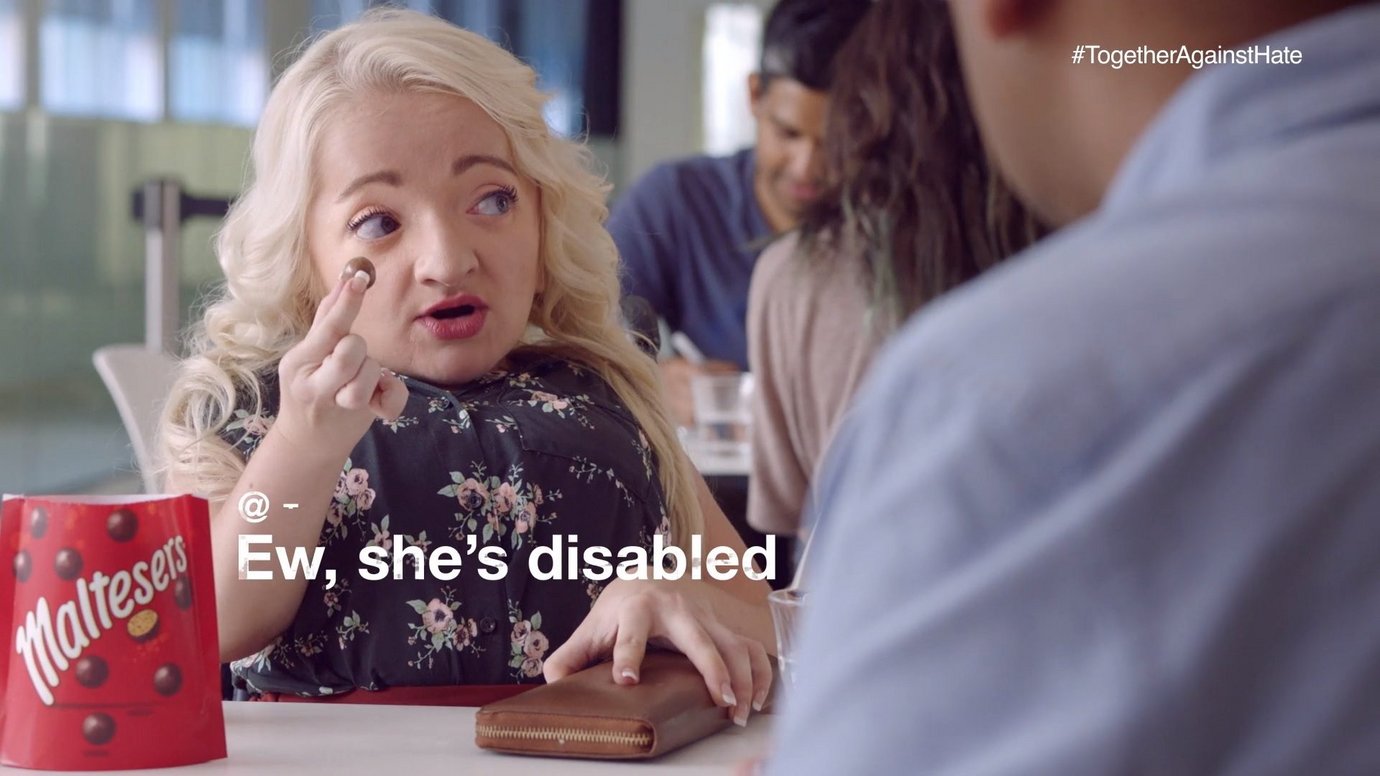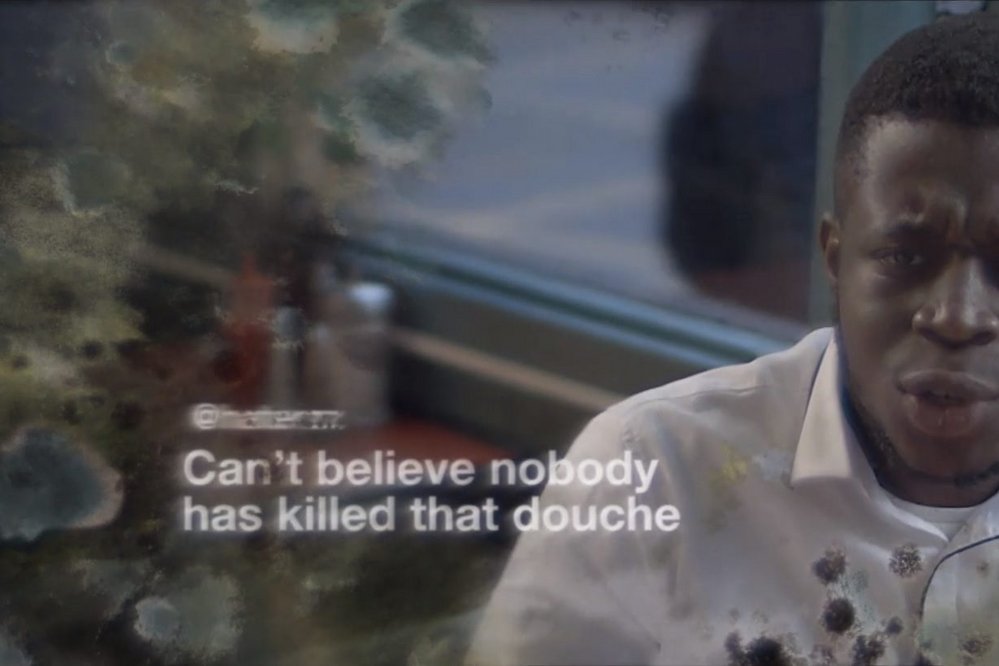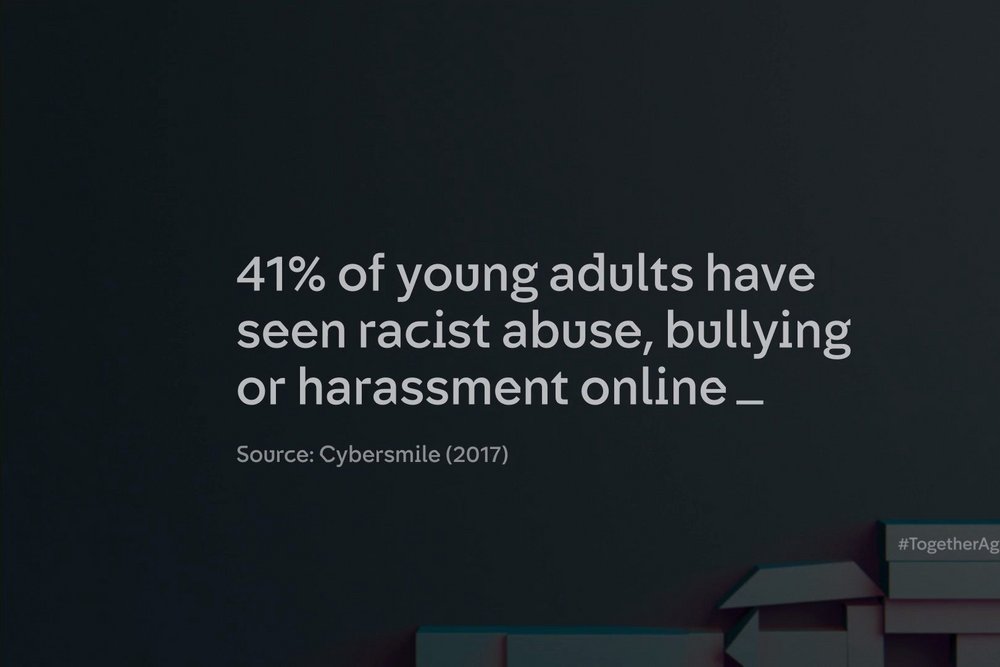Campaign of the Week
Channel 4, Together Against Hate /
UK broadcaster Channel 4 dedicated an entire commercial break to highlighting the online abuse hurled at TV ad actors. From Contagious I/O.

The Together Against Hate campaign adapted ads (from Nationwide Building Society, chocolate brand Maltesers and frozen food brand McCain) that had previously aired on the channel by overlaying cruel online comments on top of the original footage.
For example, McCain’s We Are Family advert received a tirade of homophobic abuse for a scene showing a two-father family. In the adapted TVC, the portions of the ad with the gay parents were covered with examples of abusive tweets, such as ‘Faggotry’, ‘Degenerative Poofs’, ‘Sickening’, ‘Child abuse’.

Nationwide’s ad featured performer SugarJ Poet, who received similarly shocking racial abuse (‘Looks like a gorilla’, ‘Smack the chap in the gob’, ‘Can’t believe nobody has killed that douche’).
Samantha Renke, an actress with brittle bone disease, also received online abuse after starring in a Maltesers ad because she’s disabled (‘Ew, she’s disabled’, ‘Imagine kids watching this’, ‘Disgusting, freakish and awful’, ‘She is vile’).
The creative execution is staggeringly powerful, and there’s no doubt it gets the point across.

Along with the original ad footage, Channel 4 refers to stats - such as 41% of young adults having seen racist abuse, bullying or harassment online - and urges viewers to consider the impact of online abuse and stand against it (or speak up against it using the #TogetherAgainstHate hashtag, online).
The ad takeover aired around 9pm on Friday 7 September, during a Gogglebox (a popular British TV show) ad break. A social campaign featuring influencers talking about their online abuse experiences ran in support of the ads on the night of the premier.

The ad break activity was created with 4Sales (Channel 4’s TV sales team), Wavemaker (creators of the Nationwide Building Society ad), Zenith & Mediacom (Maltesers) and PHD (McCain). The idea was developed by 4Sales’ creative arm, PL4Y, and The Outfit, which also produced the ad break takeover.
CONTAGIOUS INSIGHT /
Powerful partnerships / This responsive ad campaign gives the brands involved a chance to assert their values in a useful way. It’s all well and good including diverse actors in your ads but, when the public is responding with abuse, there’s still work to be done.
And as the broadcaster of these ads (and a brand that pushes a strong digital presence) Channel 4 has a responsibility to address these issues. It is also acting consistently with its position as a forward-thinking, open-minded brand.
‘As social media has grown in popularity, so too has the environment in which more and more people feel it is acceptable to make vile, threatening and abusive comments,’ said Matt Salmon, Channel 4’s head of agency and client sales. ‘This unique brand collaboration highlights this important issue and demonstrates Channel 4’s commitment to championing diversity beyond our programmes whilst building on 4Sales’ industry-leading reputation for delivering original and creative ad campaigns.’
Lee Camozzi and Mat Samuels, the parents featured in the McCain ad, participated in the original TVC because ‘it’s rare to see advertising which represents our family dynamic,’ they said, ‘but it was awful to receive such horrible comments.’
By revisiting the ad and using it as a medium to expose the resulting abuse, both McCain and Channel 4 confirm their values. ‘This campaign offers a chance to put a spotlight on issues around family diversity and acceptance,’ said Camozzi and Samuels.
The same is true of both the Maltesers and Nationwide executions. All the brands involved in this initiative are doubling down on their commitment to inclusion while also pointing out that making inclusive adverts hasn’t solved the problem – further discussion, debate and evaluation is still required.
Creative impact / The adapted versions of the original TVCs also provide a powerful demonstration of the issue they’re tackling. Viewers see the nature of the abuse – making the issue more tangible.
Online abuse is a growing problem. A 2017 Pew survey found that 40% of American adults have experienced online abuse, with almost half of them reporting severe harassment, like physical threats and stalking. Why? The common thought is that online abuse is easier than its offline equivalent.
‘There are different strands to this cyber-psychological phenomenon, but one is that anonymity - even perceived anonymity – can embolden people to be more outrageous, obnoxious, or hateful in what they say than would be the case in real life,’ Alexander Brown writes in his paper What is so special about online (as compared to offline) hate speech?. ‘For instance, the perceived anonymity of the Internet may remove fear of being held accountable for cyberhate and may also evince a sense that the normal rules of conduct do not apply; the associated feeling of liberation may drive people to give in to their worst tendencies.’
Outrageous social media posts are also more likely to be shared, Gaia Vince explains for Mosaic Science. A 2017 New York University study found that messages with moral and emotional words are more likely to spread on social media – in fact, each ‘moral’ or ‘emotional’ word used in a tweet increases the likelihood of it being retweeted by 20%. And, as many studies have found, getting retweeted causes a dopamine rush, reinforcing the behaviour.
By showing the real online abuse on top of the original adverts, Channel 4 is reminding its audience that these comments were about real people. This emotive execution could get online abusers to think twice before they click the ‘post’ button next time, or at least prevent someone from retweeting the abuse in the name of ‘banter’.
The Contagious I/O intelligence tool is constantly updated with case studies, in-depth strategy interviews, stories about new technologies and trend reports. If you would like to find out more about how you can get access to this resource, click here.
Want more of the same? /
We don’t just write about best-in-class campaigns, interviews and trends. Our Members also receive access to briefings, online training, webinars, live events and much more.






